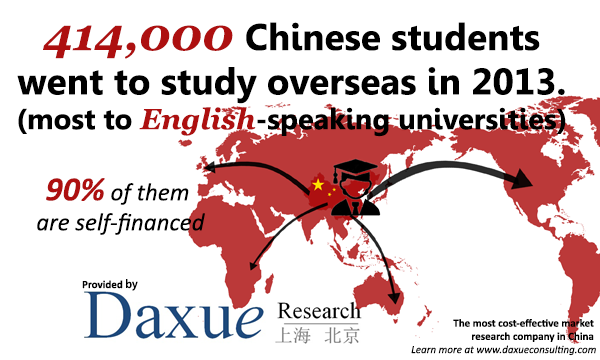Consulting China: Recruiting Chinese students to study abroad
With a pool of millions of Chinese high school students, China offers a strong potential for foreign universities and schools. By the end of this year, there should be nearly 550,000 Chinese students studying abroad. But the competition between countries and universities to recruit Chinese is fierce because the stake is sometimes crucial.
Our focus today is on Recruiting Chinese students to study abroad.
Recruiting Chinese students: where?
Not only China is the most populous countries in the world, it also has the largest flow of students abroad. Indeed, China sends more students abroad than any other country in the world. Most consultants point out a prevailing trend of studying overseas at a younger age, right after the high-school.
Destinations for Chinese Students
Going abroad for study education has already been considered as a prestige for Chinese. Hence, at first glance recruiting Chinese students is quite easy but recruiters face more and more competition.
The United-States, the U.K, Canada, Australia, Hong Kong, France are among the preferred destinations to pursue an education. Last year, more than 25% have chosen the U.S, 20% the U.K, 15% Canada and the remaining Australia, Hong Kong and France in particular. Most Chinese students pursuing their education abroad have wealthy family. American universities are seen as emblems of the highest achievement to the Chinese. Hence, most of the education market to study abroad focus on the U.S.
The middle class also has aspiration to send their unique child abroad for an education and often expect him to gain admission with scholarship in order to cover tuition fees and living expenses.
Most Chinese students choose to pursue their education abroad with the help of an agency. There exist hundreds agencies across China. Hence, agencies play a vital role in the process of recruiting Chinese students.
Recruiting Chinese students: how?
Most of time, foreign universities collaborate with the agencies to facilitate the application process. From the general information to the visa process, the agencies offer a wide range of services.
Another way to attract Chinese students is by making collaboration between universities. This way, both Chinese students can pursue a part of their degree abroad, and foreign students to get to know more about China. This is also a good way for the foreign universities to promote their post-graduate programs to Chinese. Most Chinese universities have exchange programs with foreign universities, some having much more than others. However, double-degree programs are not yet very common in China.
A third way to recruit Chinese students is through education fairs organized annually across China, in particular in Beijing, Shanghai, Chengdu and Guangzhou. The world QS tour is an example. During these education fairs, hundreds foreign universities and business schools are.
For students and/or professionals wishing to pursue an MBA, most European and American business schools gives recruitment talks across China during the application periods. Once again, the below mentioned cities are often those targeted by the foreign business schools.
Finally, a wide range of services and advises are offered by the British Council of Education and Campus France for instance. There, Chinese can make appointments with officials to discuss about their study project or to simply get to know more about the education.
What Chinese students want?
There are two main reasons why Chinese students want to pursue their education in certain countries:
– To obtain high quality education
– To gain face among their peers
The parents make careful choices when considering an education oversea for their unique child. Factors influencing Chinese students and parents’ choices include the availability of the desired major and succinctly the safety, cost and rankings. Due to philosophical approach to education and national stereotypes, parents may have preferences for certain countries.
As previously mentioned, parents are financially constrained. Hence, allocating scholarships are one way to attract the Chinese students. They also appreciate to receive constant support and documentation from the university staff regarding their applications in order to get easily accustomed to the local and social environment upon arrival. Recruiting Chinese students means also getting used to Chinese business customs: giving face, attention, and gain informal trust.
To read more:
https://www.ft.com/cms/s/0/98c4a5ac-63c1-11e3-b70d-00144feabdc0.html#axzz3BfRAxwVd








